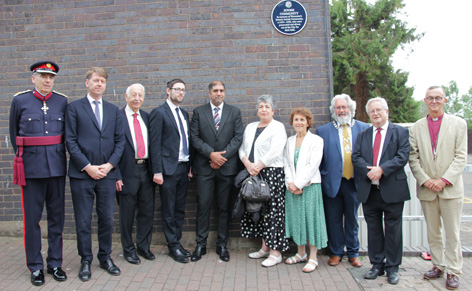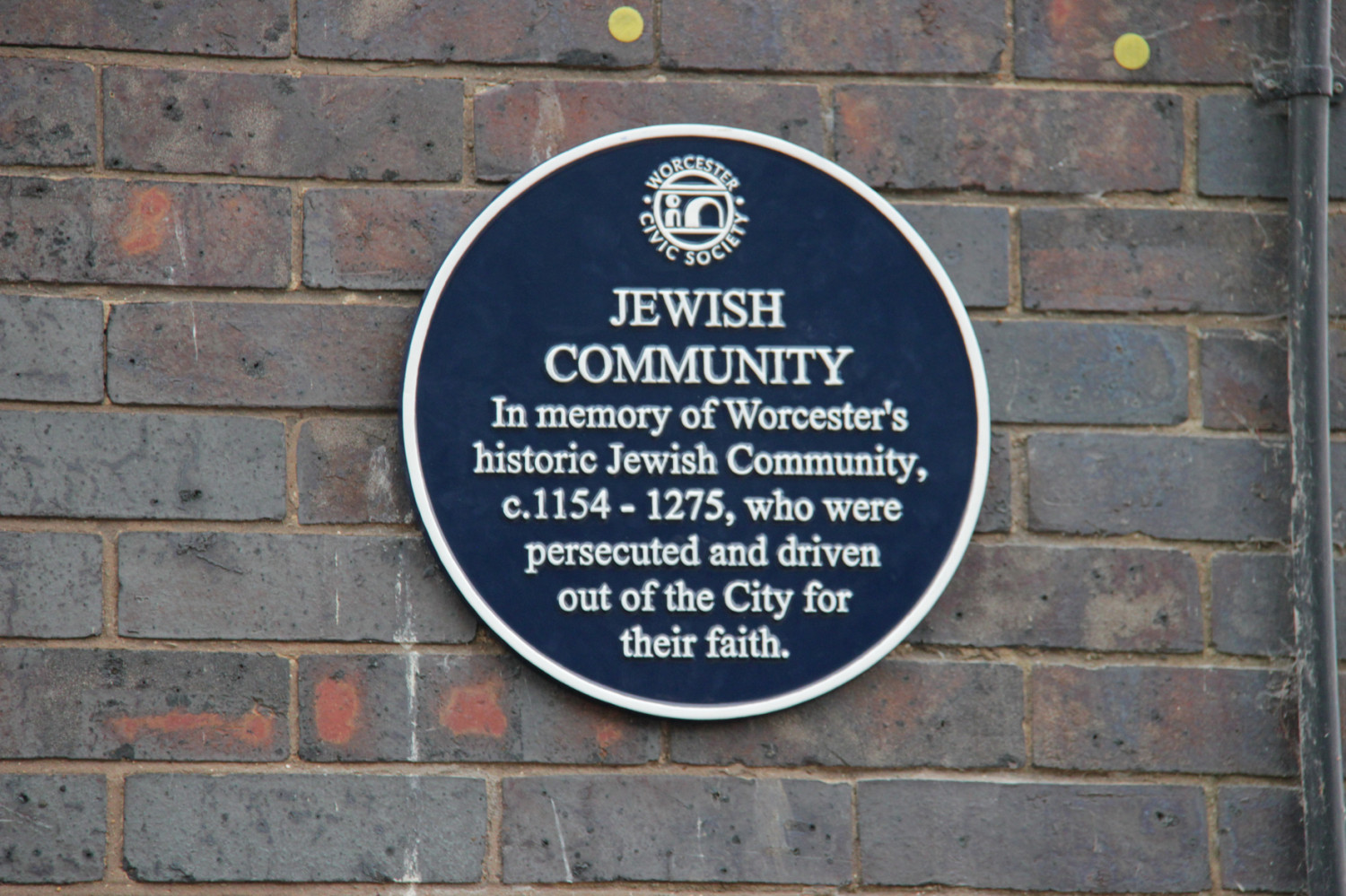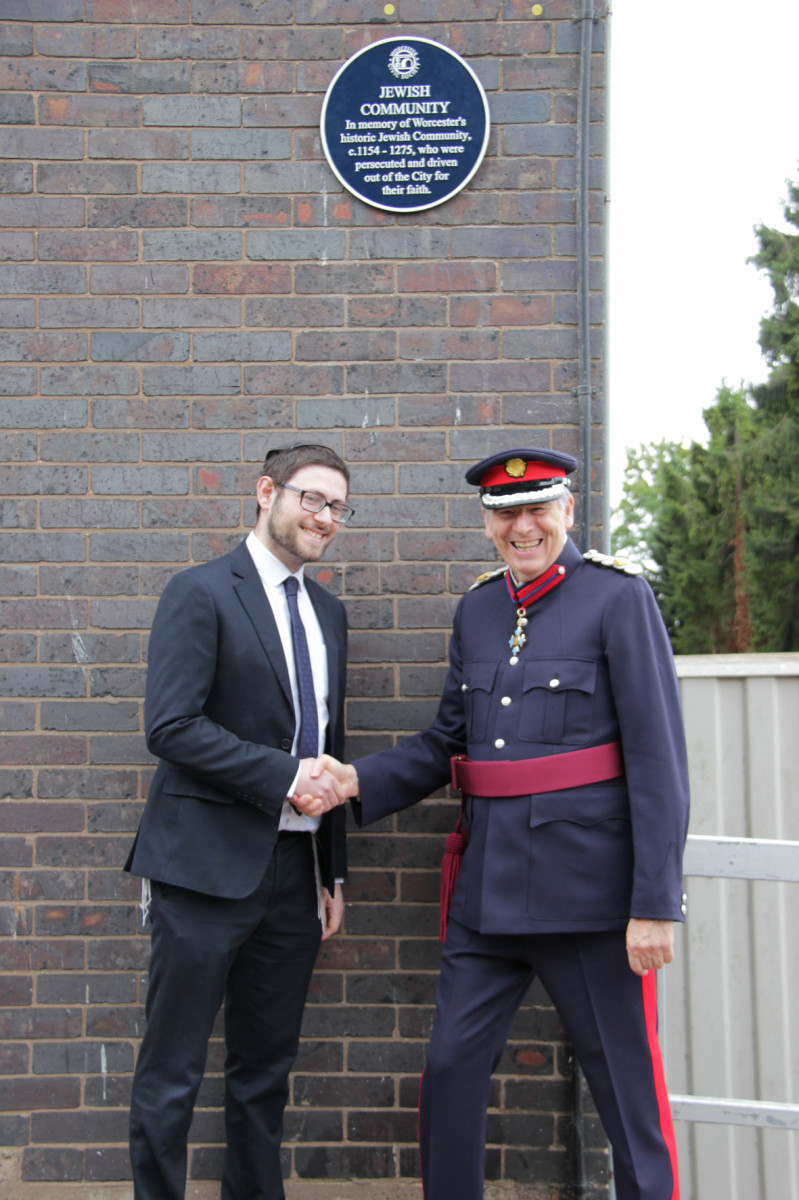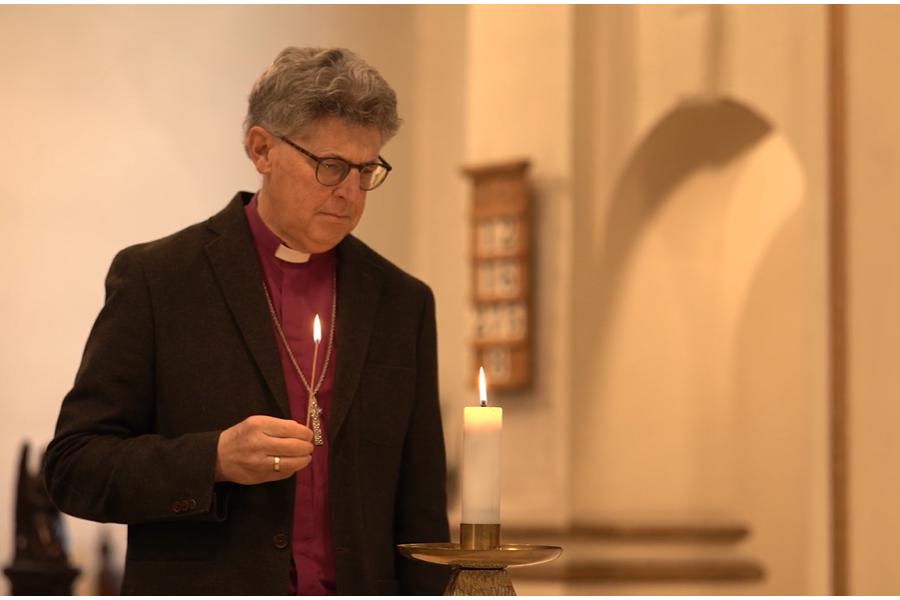 Dignitaries from all over the country gathered in Worcester on 2nd July to commemorate the city’s medieval Jewish community. Bishop John was among those who attended the event, apologising for his predecessor’s actions in helping to drive the Jewish Community from the city in around 1275.
Dignitaries from all over the country gathered in Worcester on 2nd July to commemorate the city’s medieval Jewish community. Bishop John was among those who attended the event, apologising for his predecessor’s actions in helping to drive the Jewish Community from the city in around 1275.
During the Middle Ages there was a small Jewish community in Worcester with the first reference of a small community from 1154. There is evidence that there may have been a Jewish Quarter in Cooken Street (now Copenhagen Street). During this time, Worcester, at the behest of Henry III, played host to a national gathering of England’s leading Jews to levy a tax on about a third of their property.
 During the medieval period, Worcester was one of 26 Jewish centres to have an archa or official document store for Jewish records. The archa was an official chest, provided with three locks and seals, in which a counterpart of all deeds and contracts involving Jews was to deposited in order to preserve the records. The introduction of archae was part of the reorganisation of English Jewry ordered by King Richard 1 in light of the massacre of Jews that took place in 1189-1190. The massacres resulted in a heavy loss to the Crown revenue partly as a result of Jewish financial records being destroyed in order to conceal evidence of debts. The archa was intended to safeguard the royal rights in case of future disorder. All Jewish possessions were to be registered and certain cities, including Worcester, were designated to serve as the centre for all future Jewish business operations.
During the medieval period, Worcester was one of 26 Jewish centres to have an archa or official document store for Jewish records. The archa was an official chest, provided with three locks and seals, in which a counterpart of all deeds and contracts involving Jews was to deposited in order to preserve the records. The introduction of archae was part of the reorganisation of English Jewry ordered by King Richard 1 in light of the massacre of Jews that took place in 1189-1190. The massacres resulted in a heavy loss to the Crown revenue partly as a result of Jewish financial records being destroyed in order to conceal evidence of debts. The archa was intended to safeguard the royal rights in case of future disorder. All Jewish possessions were to be registered and certain cities, including Worcester, were designated to serve as the centre for all future Jewish business operations.
 In 1263, during the Baronial Wars, Worcester’s Jewish community was attacked by the Earls of Leicester and Derby. However, Jews continued to live in Worcester until 1275 when Edward I drove them out of the city. Edward's mother, Eleanor of Provence, had insisted on it - Worcester was one of the towns she held as part of her dower lands. There has been some speculation on why she did this.
In 1263, during the Baronial Wars, Worcester’s Jewish community was attacked by the Earls of Leicester and Derby. However, Jews continued to live in Worcester until 1275 when Edward I drove them out of the city. Edward's mother, Eleanor of Provence, had insisted on it - Worcester was one of the towns she held as part of her dower lands. There has been some speculation on why she did this.
It was only 15 years later, in 1290, that Jews were expelled from England altogether, having suffered prejudice, repression, and persecution, at one time or another throughout England, by civic and church leaders and the Crown. They were not to return for over 300 years.
In an act of remembrance, over 40 people representing secular and religious organisations and major faiths of the UK witnessed the unveiling of a plaque in memory of Worcester’s historic Jewish community who were persecuted and driven out of the city for their faith. The unveiling of the plaque took place on Friday 22nd July.
Ephraim Mirvis, Chief Rabbi said:
“The story of the small but prominent Jewish community of Worcester shines a light on what it was to be a Jew in Medieval England. Despite living in a society which was frequently hostile to Jews, they remained committed to their faith and to making a contribution of real value to the prosperity of the country. As such, the unveiling of this plaque sends a powerful message to contemporary British society of the importance of industriousness, generosity and respect for all people.”
Ruth Jacobs, Chair of the Jewish Representative Council of Birmingham and West Midlands said:
"The Birmingham and West Midlands Jewish Community commend the initiative to commemorate Worcester’s Medieval Jewish Community which suffered persecution resulting in eventual expulsion by 1275. The effort and determination to establish a meaningful and permanent reminder of the presence of the Jewish community in the city is appreciated.”
Robin Walker, MP for Worcester said:
“It is right to remember both the contribution made by the Jewish community to Worcester and the tragic events that led to their persecution and expulsion from the City in medieval times. Anti-Semitism never is and never was justified and in our modern, diverse, and welcoming City, a Faithful City of many faiths, it is important that we remember the past and learn from it.”
The Bishop of Worcester, Dr John Inge, said:
"The medieval Bishops of Worcester who supported the expulsion of the Jewish community had clearly forgotten that the Jews were and are God’s chosen people. It is a privilege to join with people of different faiths and none to honour the memory of those who suffered and to do all we can to promote understanding and harmony."
Catherine Lack, Chair of the Worcestershire Interfaith Forum said:
"For me this has been a bit of a revelation: I had no idea there had been a Jewish community in Worcester, and although I knew Jews through the ages had been persecuted, it was brilliant to learn how the local community has been affected. Of course I knew about Jews being persecuted, but this has opened my eyes to a much-neglected part of local history, and I'm grateful for that. It makes me wonder, and ask questions, about other neglected aspects of history. One reads occasionally about how biased is/was the history we were taught when young - but it needs something like this to bring it to life.”
Marie van der Zyl, President of the Board of Deputies of British Jews said:
“It is a wonderful and fitting gesture that a plaque is being unveiled to commemorate the historic Jewish community of Worcester. It is also welcome that the modern-day inhabitants of the city have acknowledged the Jewish community’s persecution and suffering and provided a poignant memorial to them. We thank all who have been involved in this project.”
Professor David Green CBE, DL, the University of Worcester’s Vice Chancellor said:
“It is very good that we in Worcester are recognising the positive contribution made by the medieval Jewish community until their cruel expulsion nearly 750 years ago. Anti-semitism has a long, ugly history. Unfortunately, it is still alive today. This plaque and the re-discovery of the hidden history of Jewish people in Worcester it symbolises will help spread the message of peace, mutual understanding, kindness and a united, flourishing community which is so important for all our futures.”
Stuart Laverick, Principal & CEO of Heart of Worcestershire College said:
"Here at Heart of Worcestershire College equality, diversity and inclusivity is of utmost importance to us and we’re honoured that a blue plaque commemorating the city’s medieval Jewish community and the adversity they faced will feature on the side of our building for local residents and visitors to remember this historic event.”

